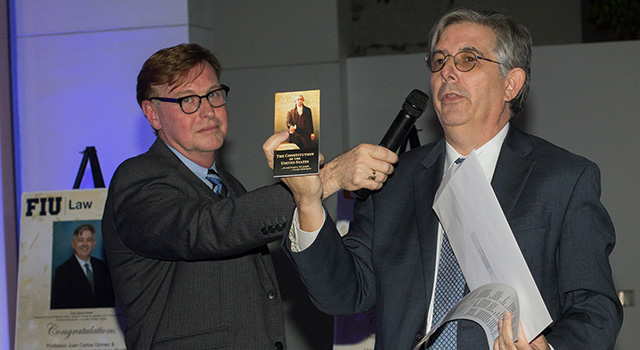By Ana Rodriguez Soto - Florida Catholic newspaper
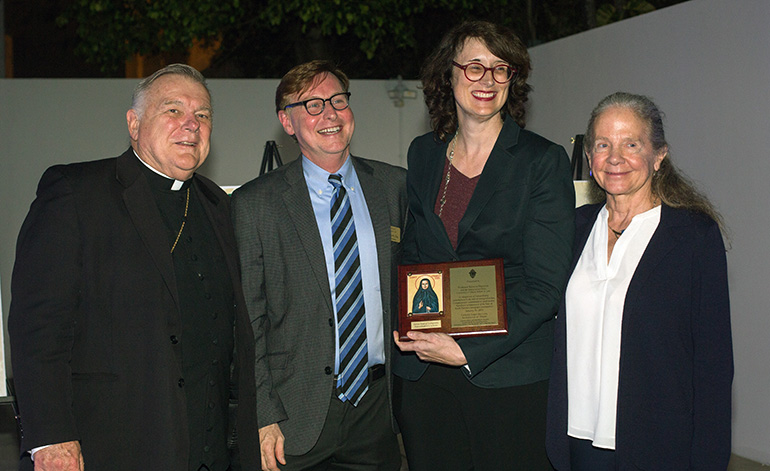
Photographer: MARLENE QUARONI | FC
From left: Archbishop Thomas Wenski and Randolph McGrorty, CEO of Catholic Legal Services, pose with Mother Cabrini award recipient Rebecca Sharpless, professor of Clinical Legal Education at the University of Miami and director of UM's Immigration Clinic, and Patricia White, dean of UM's law school.
MIAMI | Lawyers doing good deeds. In many quarters, that would be considered an oxymoron.
But three Miami law professors are not only doing good deeds, they’re teaching a generation of new lawyers to do the same. And in the process, they’re helping people who, at this point in American history, may be much more maligned than lawyers themselves.
Juan Carlos Gómez of Florida International University, Rebecca Sharpless of the University of Miami, and Michael Vastine of St. Thomas University are the recipients of the first Mother Cabrini Award, presented by Catholic Legal Services of the Archdiocese of Miami in recognition of their work on behalf of immigrants.
“Mother Cabrini dedicated her life to helping newly arrived immigrants. But not only did she provide services to immigrants, she herself was an immigrant,” said Randolph McGrorty, CEO of Catholic Legal Services. “The first citizen of the United States to become a saint was a naturalized American, an immigrant. I think that’s a very important role model.”
McGrorty said the three who were honored Jan. 31 — along with the programs they lead — not only provide direct representation to immigrants who could otherwise not afford attorneys, they also serve as role models and mentors for attorneys who want to do pro bono work. And, in taking on appeals and class action lawsuits, “they help change the laws for the better.”
Gómez, who has been involved in immigration work for almost 30 years, directs the FIU School of Law’s Carlos A. Costa Immigration and Human Rights Clinic. He has represented persons before the U.S. Court of Appeals for the 11th Circuit, as well as the U.S. Department of Justice and Homeland Security in complex immigration matters.
“There’s a joke that if you’re psychotic and poor, I represent you. The poorer and more psychotic you are the more likely I am to take your case,” Gómez said, only half in jest. “I literally have small children as clients. I have mentally ill patients as clients.”
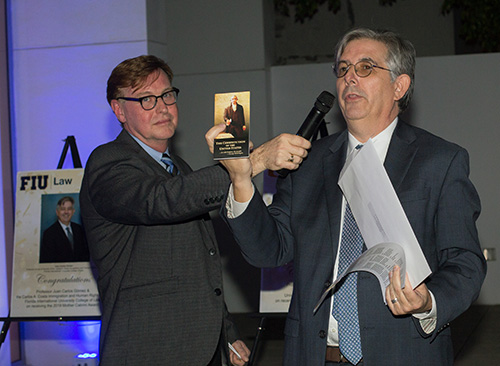
Photographer: MARLENE QUARONI | FC
Randolph McGrorty, CEO of Catholic Legal Services, holds the microphone for Mother Cabrini Award recipient Juan Carlos Gomez of Florida International University, who held up a copy of the U.S. Constitution during his acceptance speech.
Vastine directs the Immigration Clinic at St. Thomas University’s School of Law. He first came to Miami in 2001 to represent detained immigrants on behalf of CLINIC, the Catholic Legal Immigration Network. “My client base was a combination of post 9/11 improper roundup detainees and Haitian boat people,” he recalled.
He began teaching at St. Thomas in 2004. He has authored amicus briefs and argued cases that reached both the U.S. and Florida Supreme Court, including one that resulted in Florida’s criminal plea process being found unconstitutional for failing to advise immigrants of the immigration consequences of their convictions.
“You’re fighting for the minutiae because the system is so anti-immigrant. Everybody’s deportable, some even without a hearing,” Vastine said.
Sharpless is a professor of clinical legal education and director of the Immigration Clinic at UM’s School of Law. From 1996 to 2007 she worked as supervising attorney at Americans for Immigrant Justice (formerly the Florida Immigrant Advocacy Center). She also has represented low-income immigrants in cases before the U.S. Court of Appeals and U.S. district courts.
TEACHING, PRACTICING
In an emailed statement, she expressed satisfaction with her dual duties as practicing attorney and law professor.
“It has been an honor to teach law students to practice immigration law at the very highest level,” Sharpless said. “From family separation and detention to the travel ban, we are in a changed world that is eroding our core values of equality, inclusion, and the dignity of all. Now more than ever, we need highly trained and courageous immigration lawyers.”
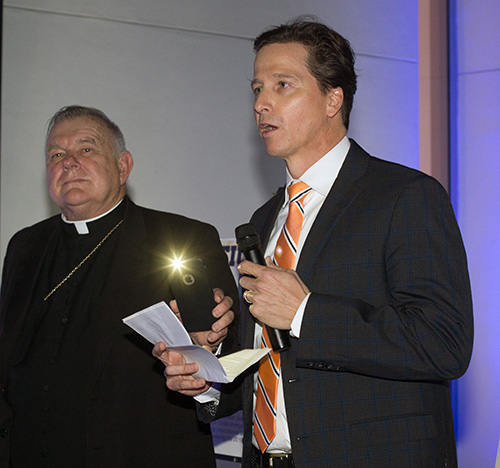
Photographer: MARLENE QUARONI | FC
Archbishop Thomas Wenski holds up his cell phone flashlight so that St. Thomas University law professor and Immigration Clinic Director Michael Vastine can read his speech accepting the Mother Cabrini award for pro bono service.
Vastine and Gómez agree with both of those sentiments: the satisfaction provided by their work, as well as the desperate need for it these days.
“The fact that you’re nurturing the next generation is good to see,” Gómez said.
Vastine noted that his second- and third-year law students are applying what they learned in school through their work with St. Thomas’ immigration clinic. “Under my supervision they’re doing ambitious immigrant defense work,” he said.
Both also commented on how hostile the climate has become for refugees and immigrants — be they documented and undocumented.
“Huge classes of people are ineligible to say, ‘Please don’t take away my green card,’” Vastine said. “What’s worse now are the courts and the prosecutors are unable to exercise discretion in compelling cases that shouldn’t be in front of the court.”
“It’s a self-created crisis,” said Gómez. “We’re the same people who used to deal with each other before Jan. 20, 2017. We’re the same people. The law hasn’t changed. Why this hostility?”
A hostility that has made even seemingly simple cases impossible to resolve, such as the fate of the DACA recipients or “dreamers.”
“DACA’s a no-brainer,” Gómez said. “These are kids who have really grown up here. They’re part of our society. We’ve become so divided as a society that we can’t even agree to give them a permanent chance?”
Vastine pointed out that “the numbers of people coming are dramatically down,” about 20 percent lower than they were 10 or 12 years ago. “And they’re acting like it’s a crisis.”
It’s true that “we never had this massive bubble of undocumented people,” he noted, but that itself was caused by harsh immigration laws enacted decades ago. Before that, people looking for work would come for a time and then return to their home countries.
“They can’t go back and forth anymore because of these giant penalties” that bar their return for as long as 10 years if they’re caught, Vastine said. Yet at the same time, the U.S. has “a crying need” for entry-level labor, and a visa quota system that makes it impossible to bring those laborers in. “If you’re going to wait 20 years, what’s the point?”
DISRUPTION
He also noted that most of the immigration policies put in place by the Trump administration have been reversed in the courts, from the separation of children and parents at the border to excluding domestic violence as a reason for asylum.
“The whole point seems to be to disrupt the system,” Vastine said, to scare people into not coming to the U.S., even legally, even as refugees from war-torn countries such as Syria and Iraq.
“Did we learn nothing from World War II that we need to protect refugees? How much do we value the unity of a family? These are the core moral and ethical values that the archbishop (Thomas Wenski) refers to repeatedly,” Vastine said.
“As a country we need to be secure, but we also need to not be self-destructive and inhumane,” said Gómez, who likes to hand out copies of the U.S. Constitution and the U.N. Declaration on Human Rights. “We must help others to have a fair chance.”
The good news is that “attorneys do make a difference,” he noted, while adding a word of praise for Catholic Legal Services. “That office is a haven for people. It’s an amazing place. A lot of people would go unrepresented if it wasn’t for that office.”
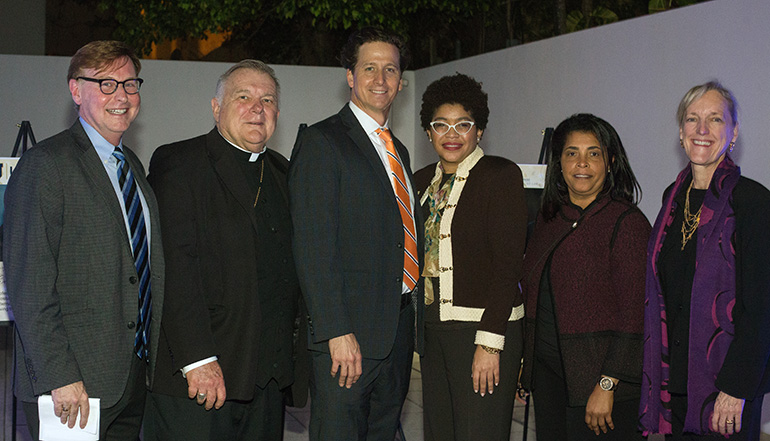
Photographer: MARLENE QUARONI | FC
From left: Randolph McGrorty, CEO of Catholic Legal Services, and Archbishop Thomas Wenski pose with Mother Cabrini award recipient Michael S. Vastine, St. Thomas University law professor and director of its immigration clinic, as well as STU Law School Dean Tamara Lawson, STU Immigration Clinic Coordinator Yanick Laroche, and Cece Dykas, STU associate dean of academic affairs and clinical programs director.
Corrected: The caption of one photo incorrectly identified Tamara Lawson as the dean of FIU's Law School. She is the dean of St. Thomas University's Law School.
